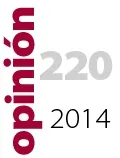2014 in the Mediterranean and the Middle East: Desperately Looking for a Glimpse of Hope

Moussa Bourekba, Gestor de proyectos, CIDOB
Francis Ghilès, Investigador Sénior Asociado, CIDOB
Moussa Bourekba, Project Manager, CIDOB
Francis Ghilès, Senior Research Fellow Associate, CIDOB
Eduard Soler i Lecha, Research Coordinator, CIDOB
Eckart Woertz, Senior Research Fellow, CIDOB
February, 4, 2014 / Opinión CIDOB, n.º 220 / E-ISSN 2014-0843
In 2013 North African and Middle Eastern countries have witnessed discontent and frustration with the slow pace of transition processes, growing violence and regional confrontation. This year has been an annus horribilis leadingmany analysts, opinion-makers and politicians to revisit the old paradigm of Arab exceptionalism and assume that the region will inevitably become a scenario of violence and radicalization in the coming years. Will 2014 confirm their assumptions or, on the contrary, will it offer some reasons to be moderately optimistic about the potential for change and peace in this region?
In Tunisia and Egypt, developments have entered a new political stage with the approval of a new constitution. Yet, at the beginning of 2014, both countries seem to undertake divergent paths. While the military-led restoration in Egypt keeps on repressing Muslim Brotherhood members and revolutionary activists, Tunisia has opted for consensus and compromise.. The new Egyptian constitution commendably enlarges some individual rights, but at the same time it strengthens the supervising role of the military - alienating large segments of society. In Tunisia, the new constitution also widens the rights and freedoms of Tunisians, but such exercise has been far more inclusive as it accommodates all sensitivities. The consolidation of the ‘Tunisian way’ to democracy could send out a strong signal to people and political elites in the region.
Meanwhile, in Libya the central authorities have been unable to demobilize militias and have lost control over vast parts of the country’s east and south. Militias temporarily kidnapped Libyan Prime Minister Ali Zeidan in October 2013 and there has been an upsurge of violence since then. In the meantime, territorial tensions in are at a high, allowing all sorts of scenarios. One of the rare items of good news from Libya is the courageous mobilization of ordinary citizens against these militias and the multiplication of bottom-up initiatives aiming at shaping a new future in a country where civil society was almost inexistent.
A key country in North Africa, Algeria, will hold its next presidential elections in April. Abdelaziz Bouteflika, despite serious health concerns, could run for a fourth term. Other figures - such as former Prime Minister Ali Benflis - have already announced their candidacy. In this respect, the main question-mark is whether Algerians will have a real choice and whether change from within the system could occur in the coming years or not. In a turbulent region, Algeria’s capacity to become a regional order-instituting country not only depends on its ability to manage its domestic stability but also to allow a new generation to access to power.
In Morocco, further King-led reforms are likely to be carried out in 2014. Political tensions - mostly involving the PJD and other political parties - have calmed since July 2013. Besides, despite of a general improvement in the economic situation, during the previous year we have been witnessing how Moroccan society mobilized around various scandals and affairs involving individual rights and freedoms (corruption, violence against women, DanielGate, etc.). This bottom-up pressure is the only guarantee to the continuation of the top-down reform.
The situation is much less promising in the Middle East. In 2013 the conflict in Syria has become one of the worst ever since the Second World War. The UN is no longer counting the victims: almost two and half million Syrians are already registered as refugees in third countries and nearly 6 million are internally displaced. What started as a peaceful process against an authoritarian regime has dramatically degenerated into a civil war that is already affecting Syria’s neighbors, mainly Lebanon and Iraq. 2014 started with the Geneva 2 talks during which part of the opposition and the regime finally managed to sit around the same table. Too little was achieved. It was unrealistic to expect more at this stage. There will only be some prospects for a durable solution in Syria if local actors are ready to compromise and their regional and global sponsors force them to do so. We are not there yet. Domestically, the Syrian war is a battle for survival. Regionally, it is a quest for hegemony by Iran and Saudi Arabia. Globally, it is a matter of prestige and status for Russia, the US and other powers.
In 2014, most of the aforementioned prospects can not be analyzed without paying attention to the new geopolitical trends reshaping the region. 2013 has been a key year, at least for (re)defining regional leadership, especially after Mohammed Morsi’s ouster from power in Egypt and Hassan Rohani’s election in Iran. The effects of these changes are to be followed up in 2014. On top of it, Erdogan, in Turkey, is now struggling with domestic tensions while his foreign policy choices are contested at home and abroad. Saudi Arabia has been playing a larger role while Qatar has been compelled to down-scale its political activism. As for global powers, Russia is back to the Middle East; the US makes clear that they do not want to solve all the problems of the region, nevertheless Kerry is personally involved in reaching a framework agreement between Israelis and Palestinians; the EU is too busy with solving its internal crises while individual member states, which were able to shape the agenda in Libya and Mali, are now far less active. In this scenario, a rapprochement between Iran and the West would make a difference.
Should regional and global powers come to the conclusion that hegemony is not a viable option and understand that all have a long-term interest in deescalating violence and tension in the region, 2014 could then harbor a glimpse of hope in a tormented region.